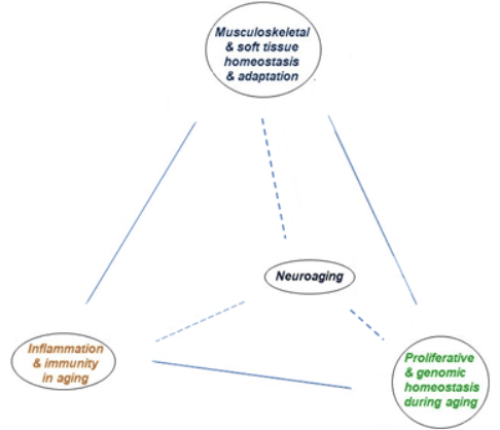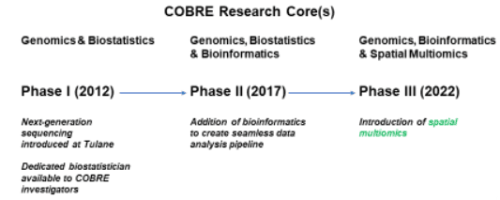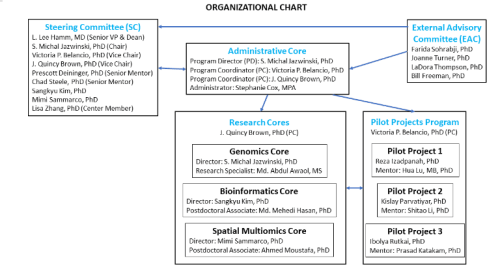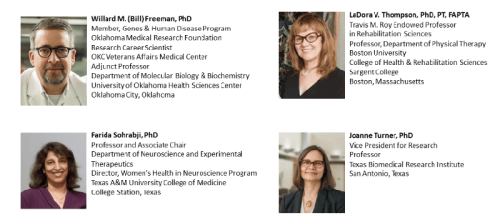
Center of Biomedical Research Excellence (COBRE) in Aging and Regenerative Medicine
Aging is a biological process that is the major risk factor for chronic disease and degeneration during the lifespan. However, it is beginning to be appreciated that disease and degeneration impinge on the aging process, in something akin to a feedback loop, suggesting that a better knowledge of one contributes to an understanding of the other. This necessitates that development of therapeutic interventions must address the degenerative disorders of aging, while the search for broad interventions that target the biological aging process itself continues. Our COBRE in Aging and Regenerative Medicine has these twin objectives. This agenda calls for the creation and nurturing of an environment in which multidisciplinary research of sufficient breadth is focused on key elements of aging and regeneration. At the same time, it is necessary to populate this translational space with talented and successful investigators. Our Phase I and II COBRE launched and further propelled us in this direction by allowing us to seed several key research topics with ambitious investigators, who in just ten years have shown remarkable success by each securing at least one NIH R01 or R01-type grant at an average rate of 1.4 grants per year. Some have already secured a second R01, in addition to other research project grants such as R21.

The multidisciplinary theme in aging and regenerative medicine that was adopted for our COBRE in Phase I was designed to capitalize on biomedical research interests and emerging potential at the university, with the goal of developing strength in focused areas across the basic, translational, and clinical continuum. Phase II built on this foundation to enhance research infrastructure, to expand further the ranks of aligned researchers, and to increase the center’s visibility on campus. The research topics explored in Phases I and II have now coalesced into four broad foci (Figure 1): Musculoskeletal and Soft Tissue Homeostasis and Adaptation; Neuroaging; Inflammation and Immunity in Aging; and Proliferative and Genomic Homeostasis during Aging. Multiple interconnections between the projects exist across stem cell function, wound healing, neurocognitive aging and neuroinflammation, metabolic regulation, inflammaging, cell proliferation, genome stability, and pathogenesis. On June 1, 2022, the COBRE in Aging and Regenerative Medicine entered Phase III, demonstrating an even faster pace of acquisition of R01 funding by our investigators.

Phase III will allow us to continue to grow our cadre of dedicated investigators through our pilot projects and by enriching the research environment through our mentoring and training programs, as well as topical seminars. These efforts will be aided by the maintenance of a state-of-the-art Genomics, Bioinformatics, and Spatial Multiomics Cores (Figure 2) that have a sustaining revenue base. Our emphasis is on multiplying the opportunities for interactions that will generate collaborative projects that are synergistic and competitive for multi-component project grant funding.

The Phase III COBRE possesses a robust Pilot Projects Program, with three active pilot projects each year. These projects are awarded for one year with the potential for renewal for an additional year based on progress. All pilot project awardees have a dedicated, project-specific mentor. In addition, intensive mentoring is provided by two senior mentors who have many years of experience in faculty mentoring. The Pilot Projects Program also coordinates workshops devoted to career development, and the COBRE sponsors a seminar series and an annual Distinguished Lecture in Aging, which are organized by the Seminar Coordinator. All aspects of COBRE activity are overseen by the Steering Committee (Figure 3) with advice from the External Advisory Committee (Figure 4).
We have a unique opportunity in our COBRE to make an important contribution to a major national health problem of the Twenty-First Century, which is related to the unprecedented expansion of life expectancy during the past several decades and especially to the continuing retirement of the baby-boomers. The latter alone raises hitherto unknown expectations related to the retention of physical and cognitive function abilities in the later decades of life.

